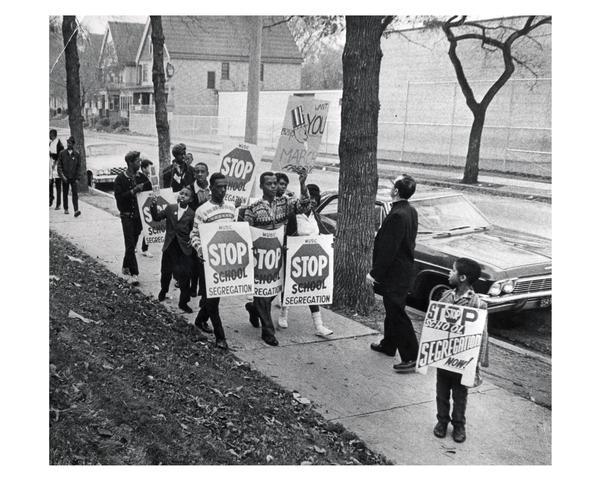School Desegregation Order Ended: What Happens Next?

Table of Contents
Immediate Impacts of the Ended Order
The lifting of the school desegregation order in Richmond brings about immediate and potentially far-reaching consequences. Understanding these changes is crucial to mitigating potential negative impacts and ensuring a fair and equitable educational system for all students.
Changes in School Assignment Policies
- Return to Neighborhood Schools: The most immediate change is likely a return to assigning students to schools based primarily on their residential addresses. This contrasts with the previous system, which likely involved busing or other strategies to achieve racial integration.
- Potential for Re-segregation: This shift raises serious concerns about potential re-segregation. Historically, residential patterns often reflect racial and socioeconomic divides, leading to schools that are disproportionately composed of students from a single racial or ethnic group. This may exacerbate existing inequalities.
- New Assignment Criteria: While a return to neighborhood schools is expected, new criteria for assignment might be introduced to address potential re-segregation concerns. These could include lottery systems, socioeconomic factors, or attempts to maintain some level of racial balance within schools. However, the effectiveness of these measures remains to be seen.
- Transitional Support: The Richmond school district should be implementing transitional plans and support systems for students and families to help navigate this significant change. This includes clear communication, resources to address potential anxieties, and mechanisms for addressing student and family concerns.
Funding and Resource Allocation
The end of the desegregation order may significantly alter funding and resource allocation within the Richmond school district.
- Shifting Desegregation Funds: Funding specifically earmarked for desegregation initiatives – such as programs supporting minority students, teacher training, or specialized resources – may be redirected or eliminated.
- Resource Disparities: This reallocation of funds could exacerbate existing resource disparities between schools, particularly those in predominantly minority neighborhoods. Schools may find themselves lacking essential resources, leading to inequities in educational opportunities.
- Impact on Support Programs: Programs designed to support minority students, including mentoring programs, specialized academic support, and culturally responsive curriculum, could be affected, potentially hindering academic progress and achievement for these students.
Long-Term Effects on Educational Outcomes
The long-term consequences of ending the school desegregation order in Richmond are complex and difficult to predict. However, several key areas warrant careful consideration.
Academic Achievement Gaps
- Widening Achievement Gaps: A primary concern is the potential widening of academic achievement gaps between different racial and ethnic groups. Research consistently demonstrates the positive impact of desegregation on academic outcomes, particularly for minority students. The reversal of these policies could lead to negative consequences.
- Mitigating Negative Impacts: Strategies to mitigate potential negative impacts include targeted interventions, equitable resource allocation, and culturally responsive teaching practices. These efforts require significant investment and a commitment to educational equity.
- Data-Driven Approach: Careful monitoring of student achievement data will be crucial to identify any emerging disparities and adjust interventions accordingly. A data-driven approach is essential to track progress and inform policy decisions.
Social and Racial Integration
Beyond academic achievement, the end of the desegregation order may impact social and racial integration.
- Increased Social Segregation: The return to neighborhood schools could lead to increased social segregation, limiting interactions between students from different backgrounds. This lack of exposure to diverse perspectives could affect social development and understanding.
- Community Involvement: Fostering positive inter-group relations requires active community involvement. Community organizations, schools, and parents play a crucial role in creating inclusive environments and promoting understanding.
- Integration Initiatives: Initiatives aimed at fostering positive inter-group relations, such as collaborative projects, cross-cultural events, and inclusive extracurricular activities, are crucial to counteract the potential for increased social segregation.
Legal and Political Ramifications
The termination of the school desegregation order also carries significant legal and political implications.
Potential Legal Challenges
- Legal Challenges: There is a possibility of legal challenges to the decision to end the desegregation order, particularly if it leads to demonstrable racial disparities in educational outcomes or resource allocation. Civil rights organizations may file lawsuits to ensure the district maintains a commitment to equitable education.
- Opposing Groups: Groups advocating for educational equity and racial justice may actively oppose the order's termination and actively work to ensure the implementation of measures that protect minority students' rights.
- Legal Precedents: The outcome of any legal challenges could set important precedents for other school districts facing similar situations, influencing future desegregation efforts nationwide.
Political Landscape and Public Opinion
The political ramifications of the decision extend beyond the legal realm.
- Political Consequences: Elected officials will likely face scrutiny regarding their stance on the issue and the potential consequences for their constituents. Public perception of their actions will play a significant role in their future political prospects.
- Public Opinion and Activism: Public opinion on school desegregation is varied and complex, reflecting differing viewpoints on race, education, and social justice. Community activism will play a pivotal role in shaping policies and ensuring accountability.
Conclusion
The ending of this school desegregation order marks a crucial turning point for Richmond’s educational landscape. The potential consequences, ranging from re-segregation and funding disparities to widening achievement gaps and decreased social integration, are significant. Understanding the complexities and uncertainties involved is vital. We must carefully monitor the implementation of new policies and proactively address potential challenges. The impact of this decision on school desegregation efforts will be felt for years to come.
The ending of this school desegregation order underscores the ongoing need for vigilance and advocacy in ensuring education equity for all children. Staying informed about developments and actively participating in community discussions and initiatives aimed at promoting school diversity and educational equity is vital to securing a fair and equitable future for every student in Richmond and beyond. Let's work together to ensure that the legacy of this desegregation order is one of progress, not regression, toward a more equitable and integrated educational system.

Featured Posts
-
 Actor Michael Sheen Erases 1 Million Of Debt For 900 People
May 02, 2025
Actor Michael Sheen Erases 1 Million Of Debt For 900 People
May 02, 2025 -
 Onacceptabel Lange Wachttijden Bij Tbs Klinieken
May 02, 2025
Onacceptabel Lange Wachttijden Bij Tbs Klinieken
May 02, 2025 -
 Play Station Beta Program Sonys Latest Announcement
May 02, 2025
Play Station Beta Program Sonys Latest Announcement
May 02, 2025 -
 Tongas Stunning Victory How They Dashed Sis Hopes
May 02, 2025
Tongas Stunning Victory How They Dashed Sis Hopes
May 02, 2025 -
 Heartbreak In The Rugby Community Remembering A Beloved 10 Year Old
May 02, 2025
Heartbreak In The Rugby Community Remembering A Beloved 10 Year Old
May 02, 2025
